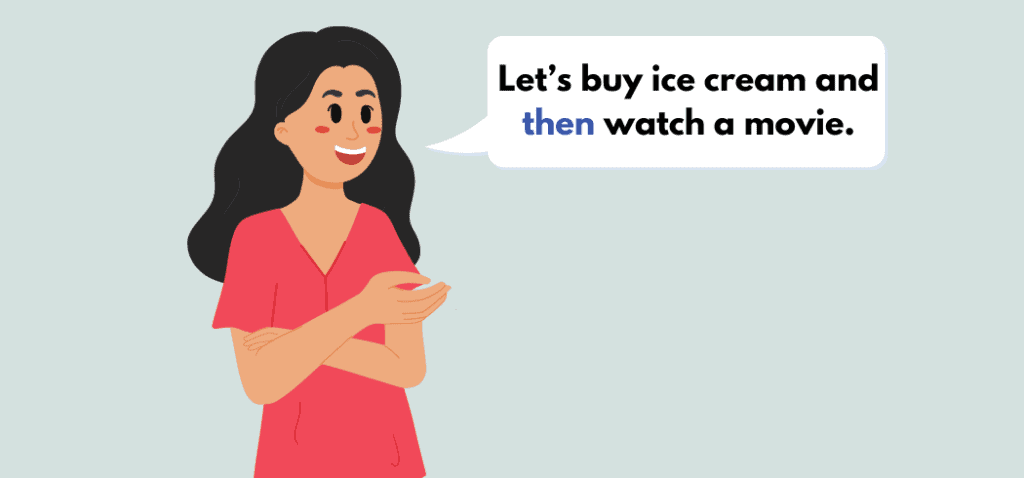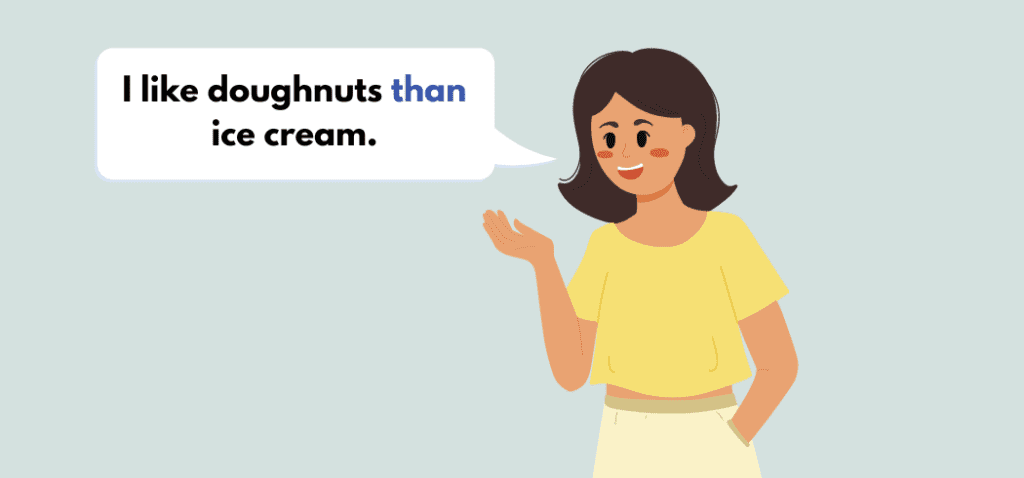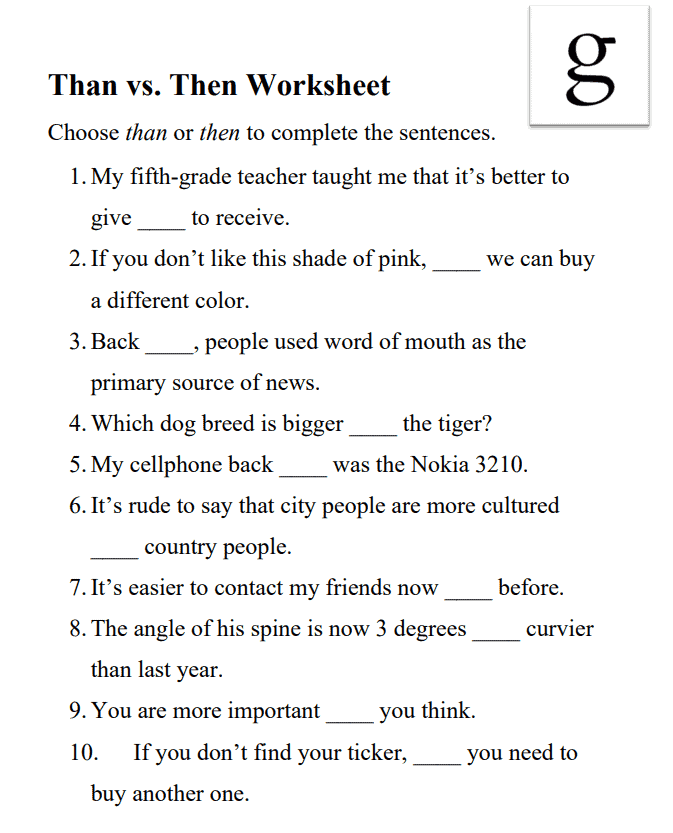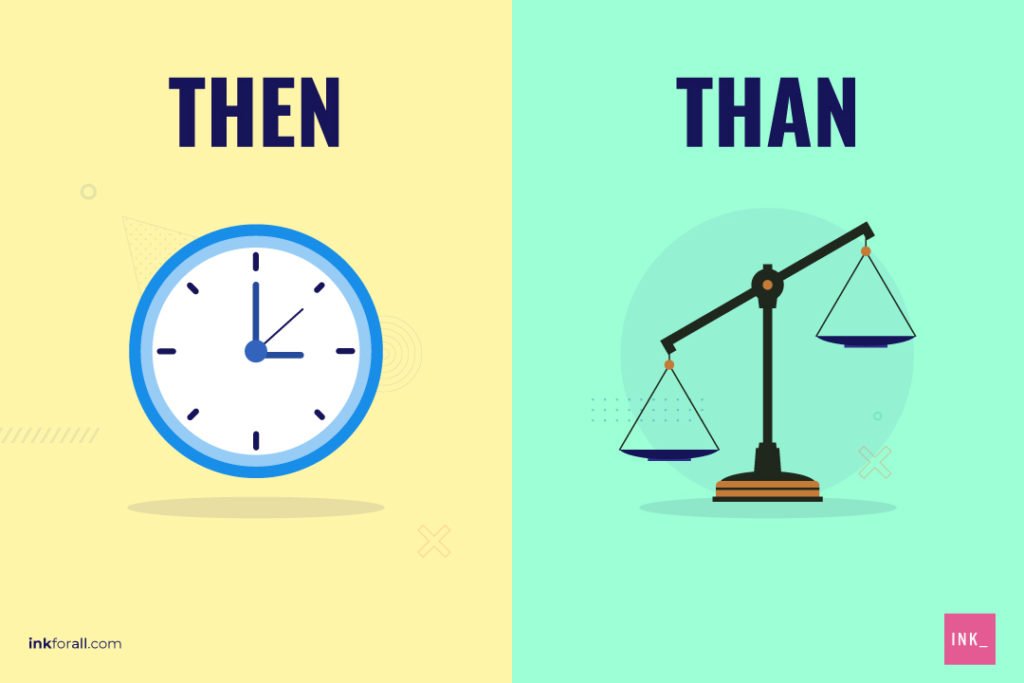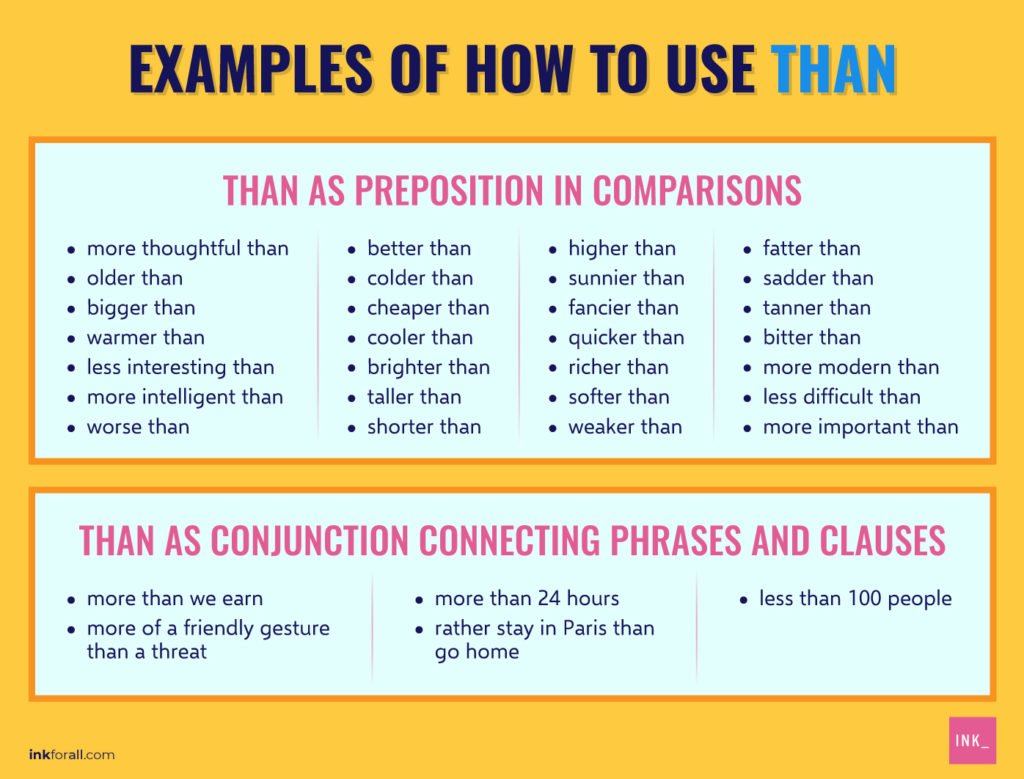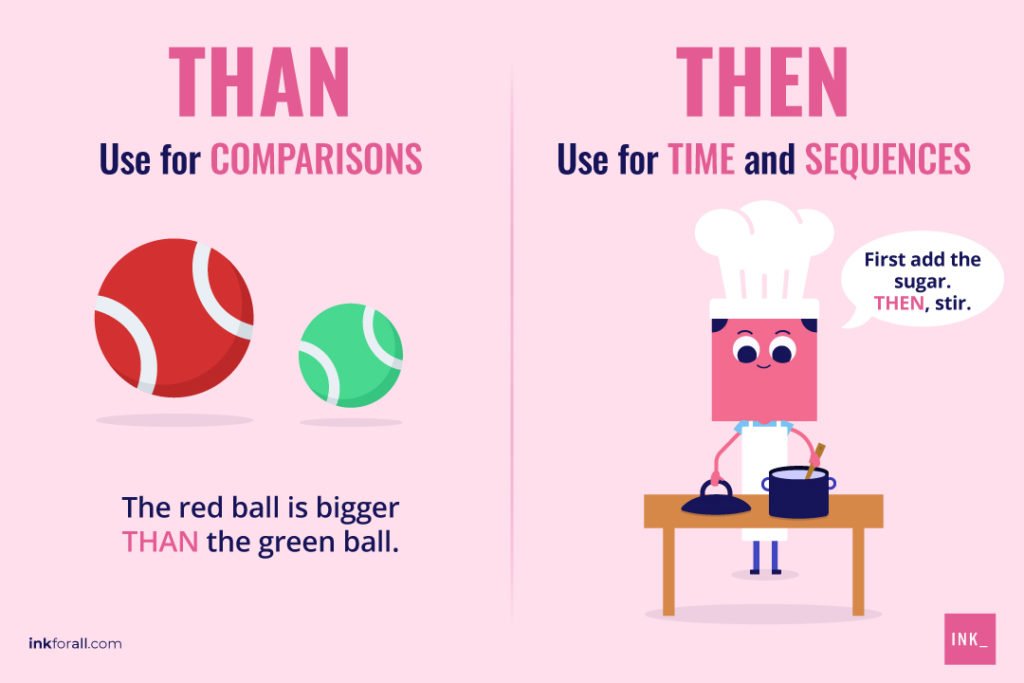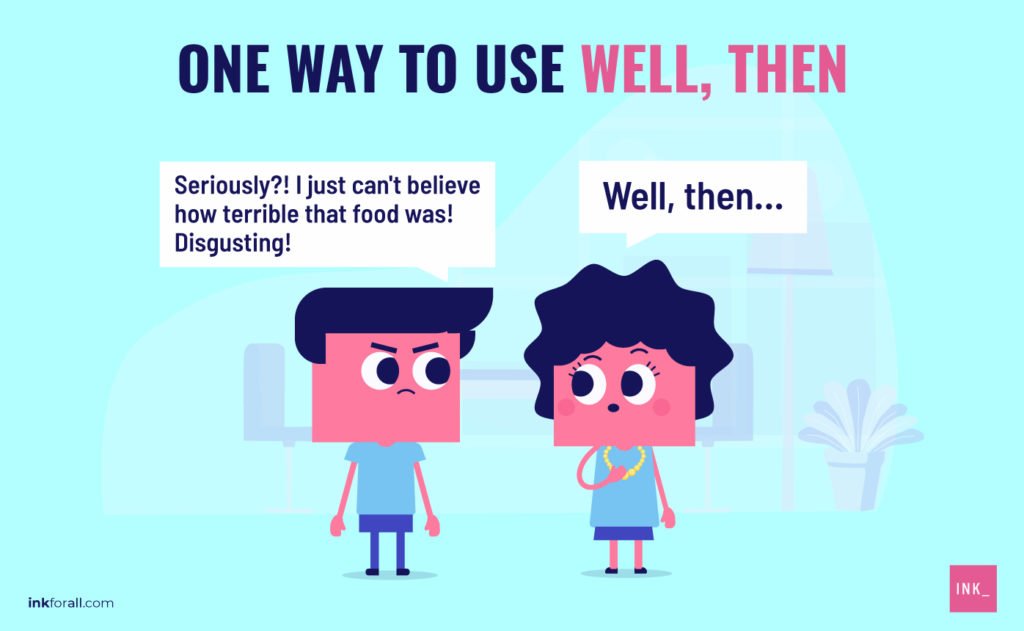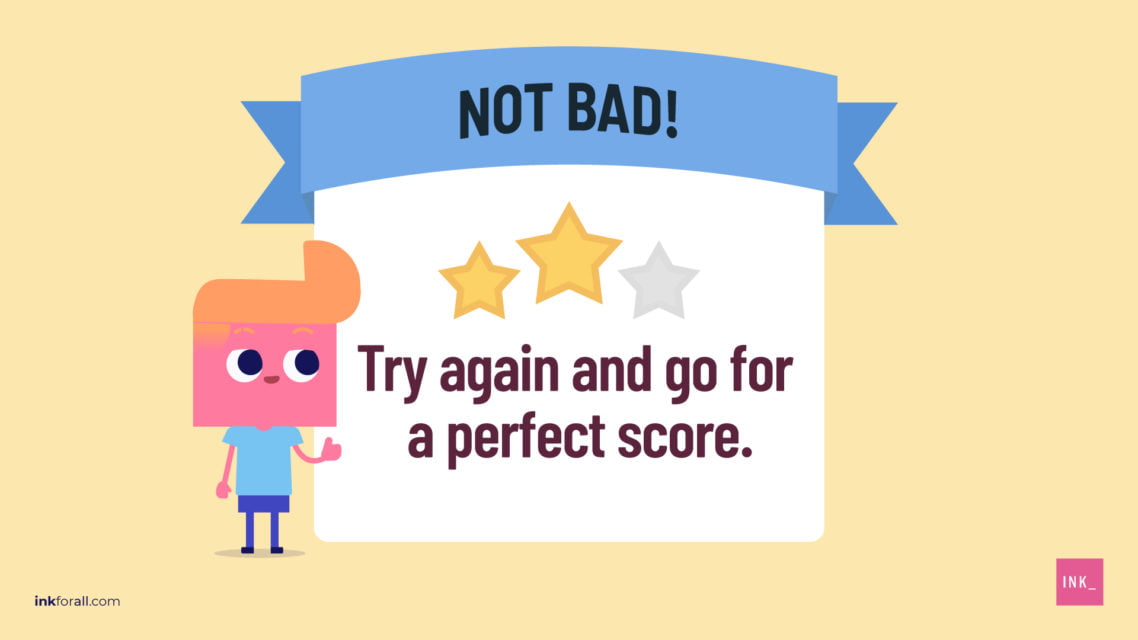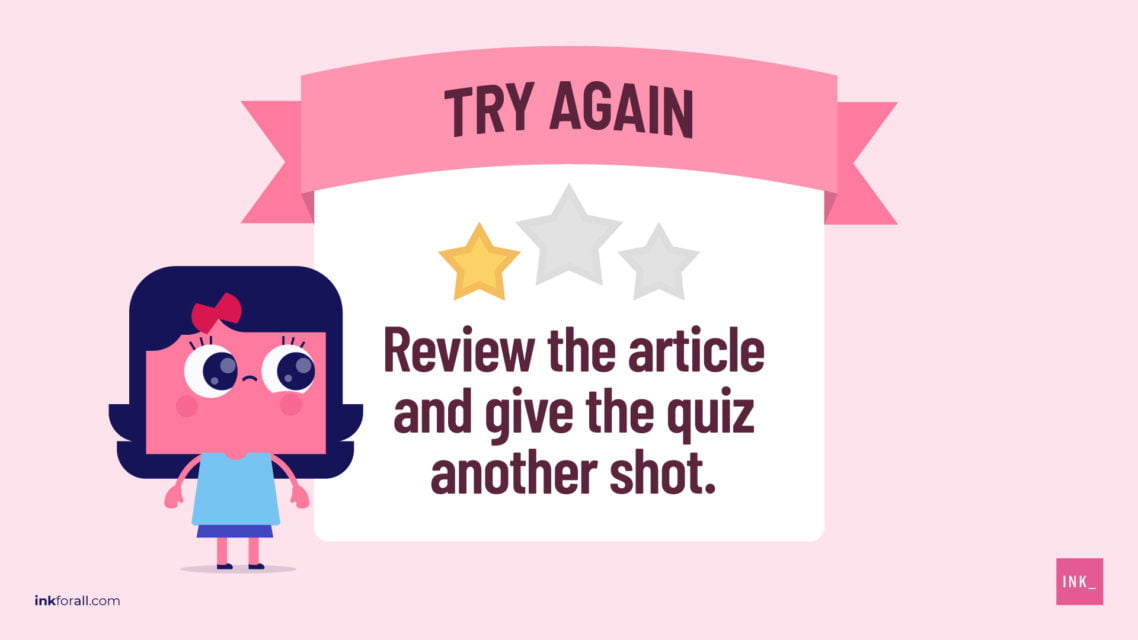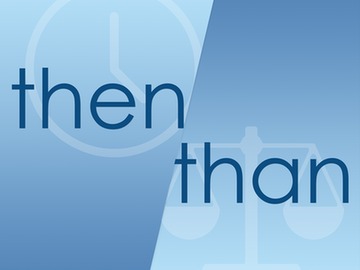Even Native English speakers mess up than and then because of their similar spelling and pronunciations. However, their meanings significantly vary.
This guide will show you nuanced differences between then vs. than. Learn when to use the two words in the sentence before the self-anointed grammar policemen point out your grammar error.
Then vs. Than: What’s The Difference?
Then is an adverb, noun, or adjective that indicates a previous time. Meanwhile, than is a conjunction used when comparing two items or people.
Use then in writing or events when there is an element of time. In the English language, then means at that time, at that point, or next. You’ll find it in phrases like since then and until then to show a reference of time.
Use than in common phrases like better than, further than, taller than, or broader than. You’ll find this word after terms like other, less, more, and rather.
In Middle English, then and than used to be the same word used for all their meanings. People used them to show relationships with time and for comparison purposes. However, modern writing now treats them differently.
That’s why the two words are now homophones people get confused with. Homophones are words that show an essential difference in spelling but similarities in sound.
When to Use Then
You can use then as an adverb to replace at that time in question to make grammatical sense. This adverb helps you place events in time in order, such as when relating to a future time.
Examples:
- But by then, Shannon might be tired.
- Let’s buy ice cream and then watch a movie.
Here’s a longer, multilayered example of then relating to the future.
My first subject is Chemistry, then French, then Science. Then, I’ll have lunch, go to Math class, and go home.
Then can also mean previous or former. Some English speakers use the term if they can’t recall the exact time of an event in the past. Here are some sentences that use then relating to a previous time.
Examples:
- The then president visited our small town.
- We lived in San Diego then.
Aside from using then in terms of time, you can also use it to show consequence or mean in that case.
Examples:
- If you had taken care of the cat, then we wouldn’t be in this situation.
- I slept late, so then I woke up dizzy.
When to Use Than
Making an unequal comparison requires using a particular word in the English language. Than is the conjunction that expresses a form of comparison in a sentence. Use it to introduce the second item or person to make direct comparisons.
For instance, when you say “truth is stranger than fiction,” it means that real events are more unnatural than imagination.
Examples:
- My mother told me that a curious person is better than a know-it-all.
Is it Earlier Than or Earlier Then?
Both phrases are correct but have different meanings. The more common phrase you might be looking for is earlier than. For example, you might arrive at school earlier than usual. However, you used to come earlier then.
Is it Later Then or Later Than?
The correct phrase is later than if you want to show a comparison between two late items, people, or events.
Is it Rather Then or Rather Than?
The correct term is rather than since rather is used to show preference in a specific matter. For instance, you might know someone who wants wine rather than a martini.
Is it Other Than or Other Then?
Other than is the appropriate phrase as it means apart from or except.
Is it Better Than or Better Then?
Better than is one of the most popular phrases with the word than. To be better than something or someone means you’re superior or more excellent.
Is it More Than or Then?
The appropriate phrase is more than, which indicates a bigger value or amount. It can also mean extremely, as in more than gratefulto be reading this post.
Is it Less Then or Less Than?
Use less than as a synonym for far from or certainly not.
It is Well Then or Well Than?
The correct phrase is well then to indicate that what someone said was unexpected or inappropriate. Well than is a wrong phrase because well is not in its comparative form.
Than Me or Than I?
The traditional rule is to use than I because the longer version of the sentence is typically than I am. However, it can lead to outdated-sounding language, especially if you use a different pronoun.
Example:
- He is smarter than she.
- He is smarter than I.
Can You Start a Sentence With Then?
You can start a sentence using then when showing a list of events or a chronology of events.
Example:
- I read a book last night. Then I got hungry and ordered food.
How Do You Use Than in a Sentence?
Here are plenty of examples of how you can use than in a sentence.
An asteroid wider than two football fields will zoom past Earth in the wee hours of Thursday (Aug. 4). The asteroid is set to pass at 12:23 a.m. (ET). [Live Science].
Indeed, it may have been no more than a coincidence that Tsai Chi-chang, deputy speaker of Taiwan’s legislature, appeared to respond to Pelosi’s suit by wearing a pink tie to meet her on Wednesday morning. [CNN].
She recalls one episode in which a former employer chastised her and two other assistants, each of whom made more than $150,000 a year, she says, for putting bananas in the refrigerator, instead of on the kitchen counter. [Wall Street Journal].
The arrests on Tuesday near Krugersdorp, a city northwest of Johannesburg, bring the total number of people detained since the attack to more than 120. [The Guardian].
How Do You Use Then in a Sentence?
Let’s take a look at these examples of then in sentences.
Shark! Man in New Jersey catches, then releases a 7-foot sand tiger shark. [Fox News].
Speaking to CNN, the congresswoman Carolyn Maloney said sorry for broaching the issue in a debate – but then said again she thought Biden would not run. [The Guradian].
No, because smartphones bring these three features into one product. Then why should organizations pay for three different products, when it is indeed possible to bring all these aspects into one smart product? [Forbes]
The Real Difference Between Than vs. Then
One of the writing issues that English speakers and writers face is the confusion between than vs. then. Using the two words interchangeably can be annoying for grammar perfectionists, even in informal writing. Remember:
- Use then in a sentence when referring to a sense of time, whether past or future. You can also use it to show consequences.
- Use than to feature comparisons between two unequal items, places, persons, or events.
Answer the worksheet below to test your knowledge of this homophone.
English has a lot of confusing words, especially those words that look alike and sound alike. The two words I want to talk about today are no exception.
Choosing between then or than can be difficult since they are only a single letter apart and they sound pretty close to each other, but if you’re not sure which word to use and when, don’t worry. I get this question from a lot of readers.
What is the Difference Between Then and Than?
Today, I want to discuss the differences between then vs. than, their functions in a sentence, and give you a few tricks to remember them for the future. After reading this post, you shouldn’t have any trouble when choosing than or then.
When to Use Then

- At that time.
- I was at work then.
- Come over this afternoon; I’ll be ready then.
- Next in time, space, or order; immediately afterward.
- We saw a movie and then went out for dinner.
- We filled up the car and then began the trip.
- In addition; moreover; besides.
- The glasses are $100, and then there is sales tax.
- First you need a license, and then you can drive.
- In that case, accordingly.
- If the weather is bad, then my flight will get canceled.
- If there is heavy traffic, then I might be late.
All four of these uses are uses of then as an adverb. The use of then as an adjective is much more limited.
- Being so at the time.
- The decision was made by then chairman Bill Gates.
- The bill was signed by then President Ronald Reagan.
As you can see, most of the uses of then have to do with time. It can mean next in time or at the time. Keep this in mind for later when I give you the trick to remember.
When to Use Than

- He is taller than I am.
- She can run faster than I can.
- Your meal looks better than mine does.
- Coca-Cola is better than Pepsi.
In all of these examples, than is used to introduce a comparison between two things. This is important to keep in mind. No matter what you are comparing, whether it be time, money, speed, if a comparison is taking place, than is the correct word choice.
Popular Phrases Using Than

- More than less than; less than more than. (Less then or less than?)
- He has less than I have. (Correct)
- He has less then I have. (Wrong).
- She has more than I have. (Correct)
- She has more then I have. (Wrong)
- Rather than or rather then?
- I would rather eat than sleep. (Correct)
- I would rather eat then sleep. (Wrong)
In the above example using rather then or than, the two sentences communicate different meanings. The first sentence says you prefer (right now at least) eating to sleeping. The second says you prefer to eat first and sleep second. So, the second sentence isn’t necessarily wrong in all meanings, it’s just wrong when your intended meaning is a comparison, not an ordered list of events.
- Sooner rather than later.
- I would prefer to eat sooner rather than later. (Correct)
- I would prefer to eat sooner rather then later. (Wrong)

This means that sentences such as Jack is taller than Jill should be construed as an elliptical version of the sentence Jack is taller than Jill is. In this sentence, the name Jill is standing in for the full clause Jill is.
In other words, the pronoun that follows than is determined by whether it serves as the subject or object of the verb “understood.”
The traditional rule, therefore, requires the sentence Jack is taller than I (not me), since the full sentence is understood to be Jack is taller than I am. But it does allow for sentences like this one, The report shocked Jack more than me, since this sentence is understood to be The report shocked Jack more than it shocked me. In this sentence Jack is acting as an object of shocked, whereas in the first sentence he was the subject.
It’s probably best to hold to this traditional rule if you are writing an academic paper for school or a book for publishing, but understand that it can lead to some cumbersome, outdated sounding language.
- He is taller than she.
- You are taller than I.
In informal writing and speech, sentences like he is smaller than her are widely used and almost universally accepted.
Remembering When to Use Then and Than
We’ve spent so much time talking about than that we almost forgot about the word then, so now it’s the time to come full circle on using then and than.
A good trick to keep track of these words is that then is usually used to indicate time. Both then and time have a letter “E” in them.
Than is used to make comparisons. Both than and comparison have a letter “A” in them.
Summary
These two words are very close in their appearance, but than vs. then have very different uses.
Then is commonly used to express a sense of time or what comes next or used to be.
Than is used to form comparisons between two things.
Contents
- 1 What is the Difference Between Then and Than?
- 2 When to Use Then
- 3 When to Use Than
- 4 Popular Phrases Using Than
- 5 Than Me vs. Than I
- 6 Remembering When to Use Then and Than
- 7 Summary
Main Than vs. Then Takeaways:
- Then and than are homophones. This means that they sound almost identical when spoken but have different meanings and spellings.
- When you think of then, think of time.
- When you think of than, think of comparisons.
- Sometimes, than can be used to indicate time, but it is still typically a comparison.
- Then can be an adverb, adjective, or noun.
- Than is a conjunction.
Like affect vs. effect and to vs. too, than vs. then cause a lot of confusion. While many use these homophones interchangeably, they are not the same. Choosing the wrong word may mean that you don’t communicate your message clearly or correctly. In fact, than and then have different functions and meanings. But, there are, of course, some exceptions. Here, we’ll make sure you have everything you need to keep them straight, once and for all.
Then vs. Than Rule
Here’s the best way to tell the difference between then vs. than: associate then with time and than with comparisons. For example, use then for clarifying a sequence of events like writing a recipe or retelling a story (“We went to the supermarket and then headed home.”). Try remembering that the “e” in “then” stands for “events.”
Conversely, use than when making a comparison (“We like going to the smaller shop nearby more than going to the supermarket.”).
You might see then in a comparison, but always about time (“Back then, we were less timid than we are now.”).
Than vs. Then Exception: Comparisons About Time
There is one exception. Sometimes, than can appear in comparisons about time. But in these cases, there is still a comparison involved.
In this example, we’re dealing with time, but it’s secondary. The main function of than here remains the same: to make a comparison.
“He” is comparing his meeting time to 12 pm. He’ll be there no later than noon. In other words, other times are being compared to that one particular time-related target.
This may be confusing because we’re not drawing a 1:1 comparison between two individual things (he arrived earlier than I arrived); instead, we’re comparing one individual thing (12 pm) to a group (all times before 12 pm). Nevertheless, this is ultimately a comparison and as a result, should use then.
What Type of Word is Then?
Then usually refers to time and can function as three types of speech. First, then is usually an adverb (“If you leave, then turn off the lights”). Second, then can be an adjective (“Jackie Kennedy, then Jacqueline Onassis, studied literature“). Finally, it can be a noun (“See you then?” or “We’ll wait until then”). Conversely, than is a conjunction and is for making comparisons (“This cake is sweeter than that brownie”).
How is Then Used in a Sentence?
Then vs.than breaks down to time vs. comparisons. For instance, there are several ways to use then, and they all indicate time. Most often, then is an adverb to help clarify a sequence of events (“Wash then dry the dishes”). What’s more, then helps describe a condition and then a consequence (“If it rains, then we’ll eat inside”). Additionally, then can also be an adjective (“The then CEO”). Finally, then can be a noun (“I’ll see you then!”).
Then can function as several parts of speech. Most often, it’s found working as an adverb in sentences where time is involved, but can also be an adjective or noun. Use then to:
- Clarify a sequence or indicate the order in which certain actions occurred
- Illustrate the relationship between several actions or items
- Illustrate the consequences of a certain action
- Indicate a previously held position
Clarify a Sequence (Adverb)
Describe the Relationship Between a Condition and Consequence (Adverb)
You could also use then to tell the reader when something caused something else to happen. Those examples typically frame the second action as a consequence of the first. In that case, you’ll probably use an if/then construction, making it clear the connection between the two actions.
Indicate a Previously Held Position (Adjective)
Remember, then can be an adjective, an adverb, or a noun. It’s most often used in sentences that are discussing time. You might be demonstrating a series of events, indicating a relationship between several actions.
Refer to Past or Future Time (Noun)
How is Than Used in a Sentence?
Than is a conjunction used for comparisons (“She is taller than I am”).However, then is an adverb, adjective, or noun related to time. A point of overlap is that than can appear in comparisons about time (“Please arrive no later than 9 a.m.”).
Overall, than is important because it helps enrich the level of clarity and detail in your writing.
When the relationship between the nouns, verbs, and adjectives in a sentence isn’t equal, you can use than to indicate that one takes precedence. This helps clarify status, physical stature, order of operations, and other important information.
Like other conjunctions, than is used to connect two clauses or two words within the same clause. Unlike other conjunctions, than is specifically used to compare and contrast.
Than helps us understand which is bigger, better, louder, or simply more favored. For example, using “than” is a good way to paint a picture of how items contrast each other.
Here are easy examples of how to use than vs. then in a sentence:
Use the phrase “other than” when describing exceptions. You can replace other than with alternatives like except for and besides.
How to use Less Than and More Than
How to use More Than in a Sentence
How to Use Less Than in a Sentence
Common Expressions: Than vs. Then
Is it Other Than or Other Then?
The correct phrase is “other than” and not “other then.” Use “other than” to indicate an exception (“Other than cats, she’s not a fan of animals”). The item or situation that comes directly after “other than” is the only example mentioned that doesn’t fit into the described scenario. In this way, this structure compares the exception to the rule. Therefore, “other than” expresses a comparison. Since we use than for comparisons and then for time, “other then” doesn’t make sense here.
Is it Well Then or Well Than?
The correct phrase is “well then“, not “well than.” Use the phrase well then to switch topics. Similarly, use this phrase to start concluding a conversation or saying goodbye (Well then, I have to go. See you tomorrow!). Moreover, if a person says something strange or interesting, the response well then indicates that you’re surprised and unsure of what else to say. For this reason, some use it sarcastically.
For instance, say your friend has a history of jumping and hitting their head. You might ask them whether they think that’s a good idea. When they reluctantly say, No…, you could respond with, Well then….?! to suggest they should know better.
If someone makes a strong display of emotion or a comment that you find surprising, provocative, or offensive comment, you might respond with well then.
Notice that because “well” is an interjection in these examples, there’s often a comma between “well” and “then.”
Is it Rather Than or Rather Then?
The correct phrase is “rather than“, not “rather then.” This is because than is most commonly used in comparisons (“He’s taller than her”) while then is more for discussing time (“Sal went to the store then stopped by the post office”). Since “rather than” compares two actions or choices, it only makes sense to use “rather than” instead of “rather then.”
Is it Older Than or Older Then?
Both “older than” and “older then” are correct. But, they are not interchangeable because they mean different things. Usually, we use then for time and than for comparisons. However, this question is confusing because both “older than” and “older then” deal with time and comparisons, but in different ways. Use “older than” to compare the age of one person to that of another person (“My sister is older than I am”). On the other hand, we use “older then” to refer to a time other than the present (“See you then!” Let’s wait a week and buy it then”).
Technically both options are correct. Which one you choose to use depends on your message and the surrounding context.
Rather than accidentally making a mistake with then or than in the future, bookmark this page and review as needed. Happy writing!
Is it Better Than or Better Then?
The answer will depend on the context of your statement. If you’re comparing two things in your sentence, then the correct phrase is “better than.” However, if you are referring to a certain time in the past as better, then “better then” is the right phrase. See examples below:
Let’s see if Then and Than Still Confuse you
Then vs Than Question #1
A. The word “then” mostly functions as an adverb in a sentence.
B. Then can function as an adjective, adverb, or noun.
C. You can use “then” and “than” interchangeably in a sentence.
D. Then is often used in sentences that are discussing time.
Correct!
Wrong!
The answer is C. “Then” suggests the order in which specific actions occurred, while “than” is used for comparison.
Then and Than Question #2
Correct!
Wrong!
The answer is TRUE. Although both words sound alike, they have different meanings.
Than Question #3
Preposition
Conjunction
Both
Correct!
Wrong!
The answer is BOTH. “Than” is a conjunction or preposition, depending on how it is used in a sentence.
Than or Then Question #4
Correct!
Wrong!
The answer is THAN. “Than” is commonly used in comparisons.
Then or Than Question #5
Correct!
Wrong!
The answer is THEN. “Then” is used to indicate time.
Then vs Than Question #6
Correct!
Wrong!
The answer is THAN. “Rather than” compares two actions or choices, with the person in question opting for one over the other.
Than vs. Then Quiz Result
Expert!
Not bad!
Almost got it! Review the article and try again.
Read More: What’s The Difference Between Yea, Yeah, and Yay?
Download Article
Download Article
People often misuse the words than and then. It’s a common mistake, in part because the words are pronounced similarly or in some cases because you simply don’t know the difference. However, it is important to know in which situations you would use each word, especially for academic or business writing. As a general rule, use than to indicate comparison and then to indicate time. Practice both usage and pronunciation, and then you’ll be using these words better than anyone you know.
Grammar Help
-
1
Remember that then is a word that indicates time or sequence. In all of its uses, then is used when you want to talk about a point in time or sequence of events. If someone is asking when something happened, then is the appropriate word for your response.[1]
- For example, if your teacher asks you where you were at noon yesterday, you could respond, “I was at lunch then.”
- If someone asks when something will be ready, you could let them know to, “Come back tomorrow afternoon. I will have everything ready by then.”
EXPERT TIP
Christopher Taylor is an Adjunct Assistant Professor of English at Austin Community College in Texas. He received his PhD in English Literature and Medieval Studies from the University of Texas at Austin in 2014.
Christopher Taylor, Adjunct Assistant Professor of English, notes: «Than» is generally used to compare two things (e.g., bigger than a quarter), whereas «then» helps you establish a sequence of events (e.g., first this, then that).»
-
2
Connect a series of events using then. Another common use for then is to indicate sequential items. Use then to tell someone what comes next in time, space, or order. Some examples of these uses include:[2]
- We are going to leave at 9, and then we stop for lunch around 11.
- First, you line up part A and part B. Then, you screw them together.
- The inner planets go Mercury, Venus, Earth, and then Mars.
Advertisement
-
3
Add additional or conditional information using then. Then can also be used to mean «in addition,» «moreover,» or «in that case.» Use then when you need to add additional information to your sentence, or to modify outcomes based on conditions.[3]
- If you’re adding additional information you might say, “The dinner costs $20, and then you have to add the tip.”
- To express conditional information you may say, “If the weather is good, then we will go to the beach tomorrow.”
-
4
Use then when you are indicating something that was true at one time. In some special cases, then can be used as an adjective to indicate something that was true at the time, even if it isn’t so anymore. You may hear then used this way often with people like politicians who once held a position, but no longer do.[4]
- For example, “That program was instituted in 2010 by then President Barack Obama.”
- This use isn’t limited to just people, though. You could also say something like, “The historian wrote about the then thriving state of Rome.”
Advertisement
-
1
Use than as a conjunction in comparative contexts. A conjunction is a word used to connect 2 parts of a sentence. When you are talking about a noun (thing, person, place or concept) in relation to another noun, use than to introduce the second part of your comparison. Than is usually preceded by comparative words like better, worse, more, less, higher, lower, smaller, larger, etc. For example:
- There are more onions than scallions in your fridge.
- I can run faster now than I could last year.
- I like cloudy weather more than I like the sun.
-
2
Indicate a correlation between 2 events with than. Than can also be used with past tense verbs and some adverbial expressions. Adverbial expressions are multi-word expressions that function to modify or qualify a verb. In these cases, than is being used to indicate that one thing correlated with another.[5]
- For example, if it feels like your alarm goes off right after you fall asleep, you may say, “No sooner did I lay my head down than my clock started to ring.”
- This usage may seem similar to how then may be used sometimes, which can be confusing. The difference is that then would be used if there was a sequence, but than is not describing a sequence in this instance. It is showing correlation or relationship between 2 things, such as laying down your head and your alarm clock going off.
-
3
Use than when you can’t find a synonym for what you’re saying. If you’re trying to decide between than and then, try substituting the word. Than is a unique word with no synonyms. Then, however, can be substituted for works like “subsequently,” “next,” or “later.»[6]
- For example, it wouldn’t work to say “Jessica arrived later subsequently Joe.” Even though you’re talking about time, in this context you’re still comparing who was later. That is why this sentence needs to be, “Jessica arrived later than Joe.”
- However, it does make sense to say, “First and need to shower and next I have to catch the bus.” In this context, “next” can be substituted for then.
Advertisement
-
1
Test your usage. If you’re ever confused when you’re writing, test each word to see if it makes sense in the context of your sentence. Try asking yourself these questions as you write to find the correct word:[7]
- If I write the word «next» instead of «then,» will the sentence still make sense?
- «I will go to the store next» makes sense, so here we would say «I will go to the store then.»
- If I write the phrase «in comparison to» instead of the word «than,» will the sentence still make sense?
- «A used car costs less in comparison to a new car» makes sense, so you’d want to say «It costs less than a new car.»
- If I write the word «next» instead of «then,» will the sentence still make sense?
-
2
Practice writing with then and than frequently. The best way to get used to the different uses of then and than is to use them in context. Try writing a brief comparative essay to help you get used to than. Then, try writing out a set of instructions to practice your use of then. [8]
- Pay attention to your use of then and than in your everyday writing, too. Set aside a few extra minutes to proofread your essays, letters, school work, and documents so that you can check for the correct usage.
- You can even look for then and than quizzes and exercises online to help you test your usage.[9]
-
3
Pronounce the words differently. Phonetically speaking, native speakers of English use the schwa (ǝ, kind of like a soft «eh» sound) because it’s more efficient in daily conversations. Consequently, lots of «a»s and «e»s are not pronounced distinctly. However, taking the time to pronounce the words distinctly can help reinforce their use in your mind.[10]
- Try saying than with your mouth opened wide and the tongue pressed down toward your teeth. The vowel sounds from the back of the mouth and the throat is somewhat constricted.
- Say then with your mouth partially opened. The vowel rises from a relaxed throat and the tongue rests.
Advertisement
Add New Question
-
Question
What’s the difference between the words «than» and «then»?
Christopher Taylor is an Adjunct Assistant Professor of English at Austin Community College in Texas. He received his PhD in English Literature and Medieval Studies from the University of Texas at Austin in 2014.
English Professor
Expert Answer
-
Question
How do you use the word «then» in a sentence?
Christopher Taylor is an Adjunct Assistant Professor of English at Austin Community College in Texas. He received his PhD in English Literature and Medieval Studies from the University of Texas at Austin in 2014.
English Professor
Expert Answer
-
Question
When would you use «than» in a sentence?
Christopher Taylor is an Adjunct Assistant Professor of English at Austin Community College in Texas. He received his PhD in English Literature and Medieval Studies from the University of Texas at Austin in 2014.
English Professor
Expert Answer
See more answers
Ask a Question
200 characters left
Include your email address to get a message when this question is answered.
Submit
Advertisement
Video
-
The simplest mnemonic is that «then» is a time word equivalent to «when,» so they are both spelled with an «e.»
-
Pay attention to grammar check. If your word processor underlines or highlights the word «then» or «than,» you may have chosen the wrong word. Re-read your sentence to be sure.
-
People tend to misuse then more than than. Than mistakes may look strange or grossly incorrect; however, the then mistakes may seem more acceptable. Pay special attention to then and its uses.
Show More Tips
Advertisement
About This Article
Article SummaryX
To use the words than and then properly, remember that than is used when comparing things and then is used to indicate time. For example, if you were comparing how many oranges and apples you have, you would say «I have more oranges than apples.» But if you were explaining which fruit you bought first, you would say «I bought oranges and then I bought apples.» To learn helpful tricks for remembering the difference between than and then, keep reading!
Did this summary help you?
Thanks to all authors for creating a page that has been read 3,704,748 times.
Did this article help you?
It might be because the words are pronounced similarly that then and than are often confused by English learners. Let’s take a look at the difference.
Then
Then is used either as a time expression, as a consequence or with a sequence of events.
Then Examples:
As a time expression — Sorry I missed your call last night, I was already sleeping then.
As a consequence/result — Eat now, then you won’t be so hungry later.
As a sequence marker — First boil the water, then add the noodles.
Than
Than is not related to time, it is a conjunction. Than is used in the comparative form i.e. in comparative statements when comparing two things.
Than Examples:
You are older than I am.
She was later than usual.
That was much better than I was expecting.
A simple trick to help you remember the difference is that then is a time word like when. Both of these words are have an e in them. If you are talking about time, use the e word then.
Now decide if these sentences need then or than:
- 1 — These recipes are healthier ___ mine.
- 2 — The movie will end no later ___ midnight.
- 3 — Tell me your test score, ___ I will tell you mine!
- 4 — Summers seemed longer ___.
- 5 — This meeting, ___, is over.
- 6 — The weather was much better ___ I thought it would be.
- 7 — I don’t like crowds so I’d rather visit the countryside ___ the city.
Bookmark/Search this post with:
Than is used in comparisons as a conjunction (as in «she is younger than I am») and as a preposition («he is taller than me»). Then indicates time. It is used as an adverb («I lived in Idaho then»), noun («we’ll have to wait until then»), and adjective («the then-governor»).
There’s nothing more embarrassing then correcting someone’s language only to realize that your correction contains its own error. Like maybe the one in our first sentence. Did you see it? That harmless little four-letter word then. It should have been than.
People get tripped up on then and than all the time—and why not? They look and sound so similar, and both words function as linguistic workhorses—then is most often an adverb, while than is usually a conjunction—which means that we mostly use them to connect more obviously significant nouns, verbs, and adjectives.
Keeping ‘Then’ and ‘Than’ Separate
The way to keep the pair straight is to focus on this basic difference: than is used when you’re talking about comparisons; then is used when you’re talking about something relating to time.
Than is the word to choose in phrases like smaller than, smoother than, and further than. And it’s the word that follows other, rather, less, and more.
Then—the option to choose when time is involved—fits in the phrases just then and back then, and after words like since and until. It’s also in the phrases and then some, every now and then, and even then.
In a handful of cases, though, than is used to say that something happens immediately after something else—that is, it’s used when you’re talking about something relating to time. So in «No sooner had I explained the rule than an exception came to mind,» it’s than not then that’s required. And also in hardly had I explained it than and scarcely had I explained it than. (Sorry…)
So when did this pair get so confusing? Turns out they’ve always been that way. Linguistically speaking, they’re identical twins. In Middle English, they were the same word; both spellings were used for all the various meanings. It’s been a few hundred years, however, since English has treated them as distinct, which means we have to too. We could go back to Middle English, but we think that would be harder then—um, that is, harder than—mastering these.
More Commonly Confused Words
- ‘They’re’ vs. ‘There’ vs. ‘Their’
- ‘Who’ vs. ‘Whom’
- ‘Affect’ vs. ‘Effect’
- ‘Further’ vs. ‘Farther’
1 My school is bigger than this school.
2 You look thinner than the last time I saw you.
3 Some people think that watching sport is more boring than playing it.
4 The Volga is the longest river in Europe.
5 Ethan is much worse at German than Jake.
6 Do you think this exercise is the most difficult in the book?
7 That’s the silliest thing you’ve said today.
Spain isn’t as big as the US.
A kilo of sugar is as heavy as a kilo of iron.
To become a doctor,philosophy is less important than anatomy.( или is not as important as anatomy).
Jamie isn’t as old as Brad.
I am as good as my best friend at Maths .
Playing tennis is less dangerous ( isn’t as dangerous as parachuting) than parachuting.
It is too high to climb Mt.Everest.
He isn’t old enough to watch that horror film.
My legs aren’t strong enough to run a marathon.
I don’t have enough money.
She is too young to drive.
It isn’t warm enough.
It is too slow.

